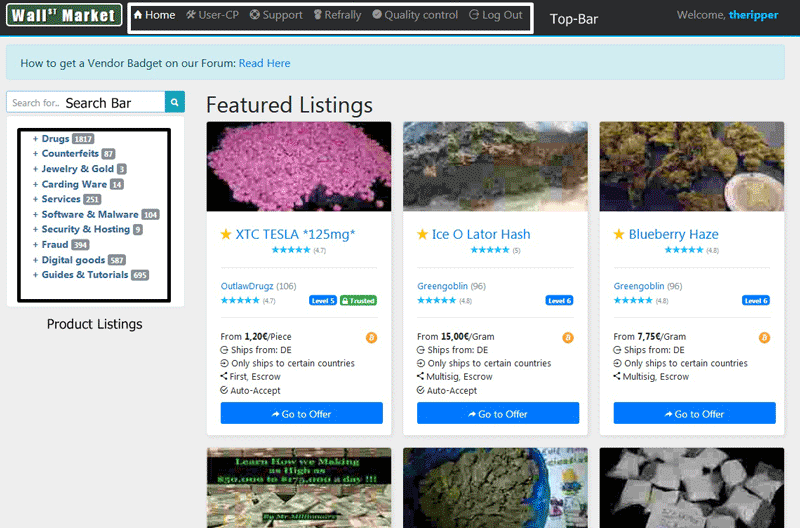This deep web has long been a subject of intrigue and worry, capturing the imagination of both law enforcement and inquisitive individuals alike. Hidden beneath the facade of the internet, the darknet operates as a shadowy marketplace where a multitude of goods and services can be found, often beyond the reach of conventional regulations. While it is often associated with illicit activities, the reality of dark web markets is much complex, revealing a range that spans from prohibited substances to valid offerings.
In the last years, these online marketplaces have evolved, reflecting changes in technology, user needs, and societal attitudes. Some markets have been shut down in high-profile operations, while others have emerged, adapting to an ever-changing landscape. The following article delves into the diverse offerings of dark web markets, exploring how they function, what is on offer, and the implications of their existence for both buyers and society at whole.
Grasping Dark Web Markets
Darknet marketplaces are digital platforms that exist on the dark web, allowing users to buy and sell a variety of goods and services, frequently without revealing their identity. These markets can range from legal items, such as digital products and privacy-enhancing tools, to illicit offerings, including drugs, weapons, and stolen data. The anonymity provided by the darknet is a key factor in the operation of these markets, as it shields users from law enforcement and possible consequences.
Entering dark web markets typically requires specific software, such as Tor, which conceals the user's IP address and encrypts internet traffic. This offers a level of privacy that draws a varied user base, made up not only of buyers and sellers but also of those looking for information or participating in discussions about privacy and security. The unique ecosystem within these platforms often includes user reviews and feedback mechanisms to build trust among participants, even with the intrinsic risks involved.
The proliferation of dark web markets has fostered both interest and concern from multiple sectors, including law enforcement and cybersecurity experts. While these markets can facilitate illicit activities, they also raise questions about digital privacy, the ethics of online trading, and the effectiveness of existing regulations. As dark web markets continue to evolve, they present a complex landscape that mirrors broader societal trends towards anonymity in digital communication and commerce.
Types of Goods and Services
Shadow markets are known for their wide-ranging selection of products and offerings that address a multitude of preferences and requirements. One of the most infamous categories includes prohibited drugs. Users can find everything from marijuana to artificial opioids, with sellers offering different strains, quantities, and potency levels. The discreteness of the dark web allows users to browse options without the worry of legal repercussions, creating a distinct ecosystem for buyers and sellers alike.

In alongside narcotics, dark web marketplaces also provide entry to forged items. darknet markets onion address can range from phony IDs to cloned credit cards and high-end products. Merchants often take considerable attention in creating realistic replicas, and consumers often seek these products for multiple motives, including avoiding police detection or taking part in fraudulent activities. The proliferation of these goods highlights the risks associated with participating in dark web transactions.
Another important offering on dark web markets is hacking services and online tools. This includes a range from phishing tools and malware to complete hacking services aimed at infiltrating networks and taking sensitive information. These services attract individuals or groups with malicious intent, tapping into a rising demand for digital crime activities. The dark web has practically become a hub for those looking to capitalize on vulnerabilities in digital security, reflecting the shifting landscape of crime in the current era.
Legal Implications and Dangers
Involvement with illicit web platforms presents serious legal implications, often differing by jurisdiction. Countless transactions associated with these markets, such as purchasing illicit drugs, arms, and illicitly obtained information, are against the law. Law enforcement authorities have established sophisticated techniques to monitor users and suppliers, which can cause apprehensions and charges. Participants may naively believe their secrecy safeguards them, but the truth is that numerous examples show users being apprehended for their digital activities.
Additionally, the risks involved extend beyond judicial consequences. Participants face potential fraud and rip-offs, as the dark web does not have the equivalent consumer safeguards as traditional commerce. Consumers can misplace funds on fake products or fail to obtain goods at all. Furthermore, participating in transactions on these markets can also expose participants to harmful organizations that may turn to coercion, violence, or blackmail if they perceive a buyer as susceptible.
Finally, there are broader social consequences of unauthorized web platforms that cannot be ignored. Their presence fuels criminal economies and compromises authorized enterprises. The distribution of illegal goods and services can lead to higher illegality, substance abuse, and social damage. Both users and the broader community must understand the extensive effects of engaging with these underground ecosystems, as they play a role in perpetuating a loop of illicit conduct and its associated dangers.
